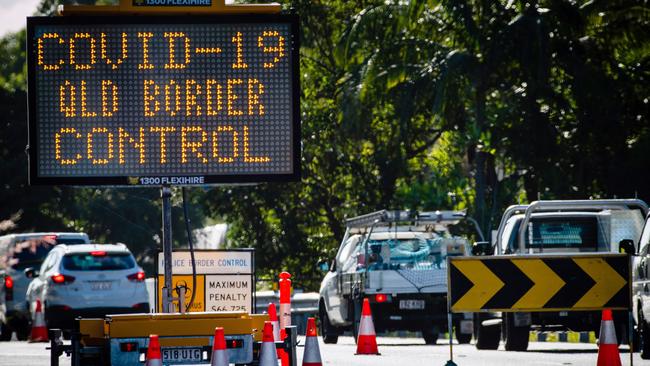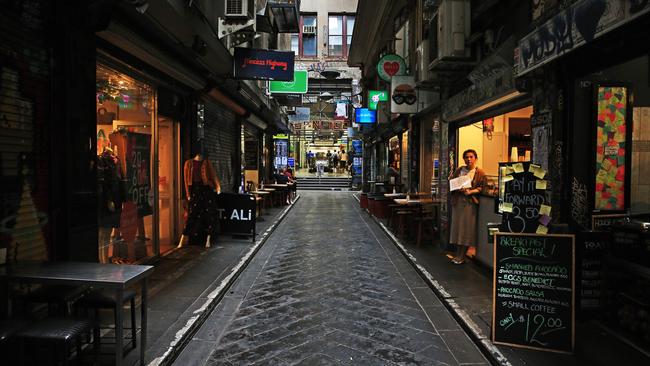Coronavirus: Disaster awaits us when money-go-round stops
Thanks to shortsighted leaders, Australians will soon be more afraid of poverty than the virus.

Shortly after World War II, British writer and theologian CS Lewis examined what he called “moral busybodies” in one of his essays on ethics. “Of all tyrannies,” he said, “a tyranny sincerely exercised for the good of its victims may be the most oppressive.”
Tyranny is a strong word; but not too strong, I think, to be applied to what we’re experiencing now: incompetent politicians exercising powers they have no idea how to control, in response to the coronavirus. Let’s not question their intentions, even though the signs of mission creep abound, and the voices of reason are drowned out by the sound of goalposts being dragged into new, contorted positions.
We were told, were we not, that by flattening the curve of infections we would buy enough time to prepare for the coming onslaught. We would take cover from the virus, ramp up our health facilities and, thus prepared, stand behind our ranks of ventilators and face it gallantly.
The problem is, we have been forbidden to break cover. We have not confronted the virus, treated our casualties and bravely returned to the barricades. We have hidden from it. There is no curve left to flatten. But the virus is still out there, and we will have to deal with it one day.
The mantra parroted by our federal leaders, premiers and the medical bureaucrats they hide behind is that they will do nothing that threatens their citizens’ health. That sounds like a noble principle, but they’re solving the wrong problem. We are no longer facing a health crisis: we are facing economic carnage.
Our leaders are stunned into idiotic paralysis. NSW Premier Gladys Berejiklian was looking a shoo-in for best on ground when she said this week, “More than 220,000 jobs lost in April is beyond our wildest expectations in terms of what could have happened.” Really? You find catastrophic modelling that says tens of thousands of people are going to die entirely believable, but those jobless figures astonish you?
Queensland’s Annastacia Palaszczuk came with a late grab at the title with her (or is it her chief health officer’s?) ruling that despite having next to no infections she would not be opening her state until September. The CHO then quantified the conditions needed to satisfy her: two consecutive 14-day incubation periods without community transmission in Victoria and NSW. So no one’s going to the Sunshine State ever again.
The defiant stupidity is beyond parody, and beyond comical. It’s costing Queensland $50m a day in lost tourism revenue. The state relies hugely on domestic visitors during the winter, with a plethora of small businesses running cafes, restaurants, tours, accommodation, transport and so on. They used to employ many thousands of mainly young people, but not now. If the border does not reopen immediately, neither will many of those businesses. By September the opportunity to recover will be lost. And there are no international tourists on the horizon.
So far, the pain is dulled by unsustainable federal handouts, ludicrously applied. I haven’t come across anyone who has had the virus, but I know a half-dozen uni students who have seen their $200 Saturday jobs turned into a $750 bonanza, without the nuisance of having to go to work. A friend in Sydney’s Bondi lives next door to a household of cheerful bludging surfers who are bewildered but joyful at the doubling of their dole payments.
Their joy won’t last. When the financial props are removed, millions of Australians will fall into a largely avoidable misery. They will soon be more afraid of poverty than the virus. At some point their debts will be called in; their overdue rent demanded; their missed payments see cars and white goods repossessed. I hope the banks and landlords are merciful, but history doesn’t suggest so.
When we reach the end of this economic disaster, let’s not forget it was man-made. In 1957, for example, the Asian flu claimed some 120,000 American lives, from a population half its current size. But the US didn’t close down business, schools or travel, destroy the economy or shatter society. Those now rather creepily celebrating an apparent rise in Sweden’s fatalities might consider that this is likely to be a marathon. We may only be kicking the reckoning down the road, where a broken nation and shell-shocked officials will be ill-equipped to deal with it.
It’s career suicide for a politician to admit they’ve made a mistake. They are conditioned from their first appearance before the selection committee to show nothing but confidence and to double down if challenged. The media bears much of the blame for this unhealthy instinct; its reporters pounce on any slip of the tongue, any sign of weakness, indecision, self-doubt, memory lapse — any of the things that mark us as human beings.
We are seeing the consequences now, with politicians whose laser focus on factional fighting, speaking in platitudes and slithering up the greasy pole has left them disconnected from reality. We’ve tolerated the lesser, state-level mediocrities because they were only supposed to look after the boring bits. They were neither equipped nor expected to make proper, grown-up decisions about people’s lives. Now they’re terrified, and so are we, but for different reasons.
Perhaps we can offer them a face-saving deal: end the lockdown while there’s something left to salvage, promise never to do anything so foolish ever again, and we will pretend to accept that their brilliant agility saved the lives of hundreds of thousands of Australians. And when the virus resurfaces, let’s pretend it’s just another bad flu and take the simple precautions we have always taken, without committing economic suicide.
Naturally, this stance will be characterised as prioritising money over lives. But it’s not. A healthy economy is necessary for life. The equation now is lives versus lives: the broken lives of people left destitute, with the attendant physical and mental health debris, versus the lives of those who will succumb to the virus. It becomes clearer, as the death toll mounts around the world, which people we most need to protect, and we should divert some of the billions we are giving away to do so.
Others who remain fearful should be urged to protect themselves; their caution should be respected, their absence from society encouraged and supported financially. Let them hide forever if they want: the government, via employment or welfare, is funding 9.5 million — roughly 72 per cent — of our 13.2 million workforce; a few more on the payroll won’t make any difference.
But those who so desire, especially the 28 per cent who pay for all this, should be allowed to return to normal, accepting the virus as just one of the multitude of risks life entails. No one will make the vulnerable mingle with the daredevils. No one will burst into their homes and lick them. Decide what level of risk you are comfortable with and live by it. I don’t go skydiving or rock-climbing; you don’t go to the pub or lie on the beach.

Instead, we are living by a policy whose costs are still unknown. Already the British government has estimated their lockdown has caused 12,000 excess deaths, through suspension of cancer and other disease screening, delays to surgery and other procedures, and the catastrophist media-fuelled hysteria that has made people too scared to visit hospitals. I haven’t seen such figures for Australia, but I’d have a substantial bet they’re higher than our 100 virus deaths.
A final thought for those who insist this downturn is the price we must pay to save the sick and elderly: others will pay too. A UN report, released last month, says after decades of lifting living standards in the world’s poorer countries, in a matter of months tens of millions will tumble back into extreme poverty. By year’s end more than a quarter of a billion worldwide will be close to starving.
There will be old people among them, but for anyone who saw the famines in Ethiopia, what haunts them still are the images of tiny, uncomprehending victims. Get ready to see them again. According to the UN, “hardship experienced by families as a result of the global economic downturn could result in hundreds of thousands of additional child deaths in 2020, reversing the last two to three years of progress in reducing infant mortality within a single year”.
There is no stopping this madness without some concerted effort by the public to make our leaders wake up to their errors, but I despair at our timid acquiescence to their witless rulings. Even in Spain, Germany and the US, some of the worst-affected countries, there have been protests in the streets. Here, rather than rage against the erosion of our liberties, the battery chickens send out hilarious memes about living under lockdown: “Hey, sleeping on the couch tonight to cut down on the morning commute!” “Now I know why dogs get so excited to go for walks!” Terrific, here’s a LOL and a smiley face for you.
We opened with Lewis, so let’s end with him. “Those who torment us for our own good,” he wrote, “will torment us without end, for they do so with the approval of their own conscience.”
I fear our leaders believe in their hearts that their paternalistic actions are in our best interests. Sadly, a righteous conscience is no substitute for dispassionate reason when it comes to protecting the country. Maybe we should all have a quiet think about what we’re doing.


To join the conversation, please log in. Don't have an account? Register
Join the conversation, you are commenting as Logout